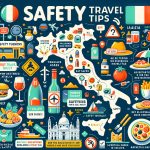Italy is a country known for its rich history, stunning landscapes, and delicious cuisine, making it a popular tourist destination. However, like any other place, it’s important to be prepared and aware of potential safety concerns when traveling to Italy. This article provides a comprehensive guide of travel safety tips for Italy, ensuring that travelers can explore the country with confidence and caution.
With its famous cities like Rome, Florence, and Venice attracting millions of visitors each year, Italy has become a favorite destination among tourists. Its vast array of cultural landmarks and attractions make it an enticing place to explore. However, amidst the excitement of discovering ancient ruins or indulging in gelato on cobblestone streets, it is crucial to prioritize safety.
Being prepared and informed about safety measures can help ensure a smooth and enjoyable trip. From learning how to navigate public transportation safely to avoiding common scams and pickpockets, this article provides valuable insights into getting around securely in Italy. Additionally, tips for choosing secure accommodations and safeguarding belongings in hotel rooms are discussed to further enhance personal safety during your stay.
Getting Around Safely in Italy
Tips for Using Public Transportation
When it comes to getting around Italy, using public transportation is often the most convenient and cost-effective option. However, it’s important to stay vigilant and follow some safety tips. First and foremost, be aware of your surroundings at all times, particularly in crowded areas such as train stations and buses. Keep an eye on your belongings and be cautious of pickpockets who might take advantage of the crowded spaces.
It’s also a good idea to research the best routes and schedules ahead of time to avoid confusion or getting lost. Familiarize yourself with the ticketing system before boarding any public transportation to ensure you have the correct ticket or pass. Additionally, if you are traveling late at night, try to stick to well-lit areas and use reputable taxi services when necessary.
Advice for Renting a Car and Driving in Italy
Renting a car can provide greater freedom and flexibility while exploring Italy, but it’s essential to be prepared before hitting the road. Familiarize yourself with Italian traffic laws and regulations as they may differ from what you’re used to in your home country. It’s worth noting that drivers in major Italian cities can be assertive and aggressive, so it’s important to stay calm and drive defensively.
Before renting a car, make sure you have all the necessary documents including a valid driver’s license and international driving permit if required. Consider renting a GPS or using a navigation app on your smartphone for easier navigation on unfamiliar roads. Lastly, always lock your vehicle when parked and never leave valuables visible inside, as car break-ins can occur in touristy areas.
Suggestions for Avoiding Pickpockets and Scams
Italy is known for its beautiful cities bustling with tourists; unfortunately, this also makes it an attractive place for pickpockets and scammers. To avoid becoming a victim, be cautious in crowded areas and highly touristy spots. Keep your belongings secure by using a money belt or a cross-body bag instead of easily accessible pockets.
Be wary of individuals offering unsolicited help, as this can often be a common scam technique. It’s also important to stay alert and watch out for distraction techniques such as someone causing a commotion or accidentally spilling something on you while an accomplice attempts to steal your valuables.
By taking these precautions, you can greatly reduce the chances of falling victim to pickpockets and scams, allowing you to fully enjoy your time exploring Italy with peace of mind.
Staying Safe in Italian Hotels and Accommodations
Choosing safe and secure accommodations is a crucial aspect of travel safety in Italy. When selecting a hotel or accommodation, it is important to consider certain factors to ensure your safety and peace of mind during your stay. Here are some tips to keep in mind:
- Research before making a reservation: Before booking a hotel or accommodation, do thorough research on its reputation, location, and security measures. Look for reviews from previous guests to get an idea of the safety standards.
- Check the location: Consider the location of the hotel or accommodation and its proximity to well-lit streets, public transportation stations, and reputable establishments. It is generally safer to choose a centrally located accommodation with easy access to amenities and transportation.
- Secure your belongings: While staying at a hotel or accommodation, take proactive measures to safeguard your belongings. Use the provided safe deposit box for storing valuable items such as passports, cash, and electronics. Avoid leaving valuables unattended in your room or common areas.
- Be cautious with strangers: Just like in any other destination, be cautious when interacting with strangers at hotels or accommodations. Avoid sharing personal information or details about your itinerary with unknown individuals.
- Familiarize yourself with emergency procedures: Take some time upon arrival at your accommodation to familiarize yourself with emergency procedures such as fire exits and evacuation routes.
In addition to these tips for choosing safe accommodations, it is also important to practice general safety precautions while staying in hotels or other forms of lodging. Lock your doors and windows securely when inside the room and use the peephole before opening the door to unexpected visitors.
By following these guidelines for staying safe in Italian hotels and accommodations, you can enjoy your stay in Italy with peace of mind knowing that you have taken necessary precautions regarding your personal safety and security.
Health and Medical Safety in Italy
Traveling to a foreign country always comes with the concern for health and medical safety, and Italy is no exception. It is important to be well-prepared before embarking on your trip by taking necessary precautions and being aware of potential health risks. This section will provide information on necessary vaccinations and health insurance, as well as offer tips for staying healthy and avoiding common illnesses while traveling in Italy.
Vaccinations and Health Insurance
Before you travel to Italy, it is essential to check whether any specific vaccinations are required or recommended for your destination. The Centers for Disease Control and Prevention (CDC) provides detailed information on their website about the recommended vaccinations for travelers to Italy.
It is advisable to consult with a healthcare professional or visit a travel clinic at least 4-6 weeks before your trip to ensure that you are up-to-date on routine vaccines and any additional ones that may be necessary.
In addition to vaccinations, it is crucial to have proper health insurance coverage during your stay in Italy. Before leaving your home country, contact your health insurance provider to confirm if you have coverage abroad. If not, consider purchasing travel health insurance that covers medical expenses, emergency evacuation, and repatriation in case of an unforeseen event or illness.
Staying Healthy While Traveling
To stay healthy while traveling in Italy, it is important to take basic precautions. Carry a small first aid kit with essentials such as adhesive bandages, pain relievers, antidiarrheal medication, and any prescription medicines you may need. Remember to pack medications in their original packaging along with copies of prescriptions.
It is also wise to practice good hygiene habits such as frequent handwashing with soap and water or using hand sanitizers when soap is not readily available. Avoid consuming tap water and opt for bottled water instead. Additionally, be cautious of food hygiene standards by eating at reputable establishments, choosing freshly prepared and hot foods, and avoiding raw or undercooked meats, seafood, and dairy products.
By being proactive in ensuring your health and wellbeing while traveling in Italy, you can enjoy the wonders of the country with peace of mind. Stay informed about any disease outbreaks or health advisories through reliable sources such as the CDC or World Health Organization (WHO), and follow their recommendations accordingly.
Safety Concerns in Touristy Areas
Touristy areas in Italy can be both exciting and overwhelming. These popular spots attract a significant number of tourists, making them prime targets for thieves and pickpockets. It is crucial to be aware of safety concerns in these areas to ensure a smooth and enjoyable trip. Here are some tips to help you stay safe in touristy areas in Italy:
- Identify and avoid tourist traps: Tourist traps are notorious for overcharging unsuspecting visitors or selling counterfeit goods. To avoid falling into these traps, do your research beforehand. Research reputable restaurants, shops, and attractions before visiting them. Read reviews and ask locals for recommendations to ensure you have an authentic experience without being scammed.
- Stay alert in crowded places: Touristy areas tend to be bustling with people, making it easier for pickpockets to strike unnoticed. Keep your belongings close to you at all times, especially in crowded spaces such as markets or public transportation hubs. Consider using a money belt or a secure bag that cannot be easily accessed by thieves.
- Be cautious at major tourist attractions: Famous landmarks like the Colosseum in Rome or the Duomo di Milano attract large crowds of tourists daily, making them perfect spots for pickpockets and petty thefts. While visiting these attractions, always keep an eye on your belongings and stay vigilant of any suspicious activities around you.
Additionally, it is important to remember that street vendors selling counterfeit items are prevalent in touristy areas. It is illegal to purchase counterfeit goods, so refrain from buying such items to avoid potential legal issues.
By following these safety tips, you can navigate touristy areas in Italy confidently while minimizing the risk of falling victim to scams or thefts. Remember to always prioritize your safety and enjoy exploring Italy’s popular destinations responsibly.
Tips for Exploring Italian Cities
Italy is renowned for its beautiful cities that are filled with history, culture, and stunning architecture. However, exploring these cities can also come with safety concerns. In this section, we will provide some valuable tips for safely navigating and enjoying Italian cities.
When walking in city streets, it is important to remain vigilant and aware of your surroundings. Italy sees a high number of pickpocketing incidents, especially in popular tourist areas. Keep your belongings close to you at all times and be cautious of anyone who appears overly friendly or distracting. Avoid carrying large amounts of cash or displaying expensive jewelry or electronics.
Another common mode of transportation in Italian cities is public transportation. While it can be a convenient way to get around, it is important to remember that crowded buses and trains often attract pickpockets. Be mindful of your personal belongings and consider using a money belt or a secure bag that is not easily accessible by others.
It is also crucial to familiarize yourself with the public transportation system before using it. Research the routes and timetables beforehand to avoid confusion or ending up in unsafe areas late at night. If unsure about directions or safety concerns, ask hotel staff or locals for advice.
Tips for Exploring Italian Cities
| Tip | Explanation |
|---|---|
| Remain vigilant | Be aware of your surroundings and keep belongings close at all times. |
| Avoid displaying valuables | Avoid carrying large sums of cash and keep expensive items hidden. |
| Use secure bags | Opt for bags that are not easy targets for pickpockets. |
| Research public transportation | Familiarize yourself with routes, timetables, and safety precautions. |
| Ask for advice | If unsure about directions or safety concerns, consult hotel staff or locals. |
By following these tips for exploring Italian cities, you can enhance your safety and enjoyment while immersing yourself in the rich cultural experiences that Italy has to offer. Remember to always exercise caution and be aware of potential risks, but don’t let concerns deter you from exploring all that this beautiful country has in store.
Cultural Etiquette and Personal Safety
When traveling to Italy, it is essential to familiarize oneself with the cultural etiquette and norms of the country. Understanding and respecting these customs not only shows appreciation for Italian culture but also contributes to personal safety. Italians greatly value politeness, so being mindful of proper behavior will help avoid potential conflicts or uncomfortable situations.
A key aspect of Italian cultural etiquette revolves around greetings and personal space. When meeting someone new, it is customary to offer a handshake while maintaining eye contact. In more informal settings, close friends may greet each other with a kiss on both cheeks. It is important to respect personal space, as Italians typically stand closer when conversing compared to some other cultures.
While enjoying the social scene in Italy, be cautious of your surroundings and belongings. Like in any popular tourist destination, there can be an increased risk of theft or pickpocketing in crowded areas, such as busy markets or public transportation hubs. Keeping purses zipped up and wallets secure in front pockets is advisable. Additionally, avoiding flashy jewelry or carrying large amounts of cash can deter potential thieves.
It is also important to note that in some areas of Italy, street vendors or individuals may aggressively approach tourists in an attempt to sell their products or services. While interacting with these individuals can provide unique experiences and opportunities, it is crucial to ensure personal safety by being aware of one’s surroundings and not engaging in activities that seem questionable or potentially dangerous.
By understanding Italian cultural norms and exercising caution in social settings, travelers can enhance their overall safety during their visit to Italy. Remember that while exploring a new country can be exciting, it is crucial to remain vigilant at all times. With a combination of respect for local culture and awareness of personal safety measures, visitors can enjoy all that Italy has to offer while minimizing potential risks.
Emergency Preparedness in Italy
When traveling to a foreign country, it is essential to be prepared for any emergency situation that may arise. This is especially true when visiting Italy, a country that is prone to natural disasters such as earthquakes and floods. In this section, we will provide valuable information on how to be prepared for emergencies and what steps to take in case of an unexpected event.
First and foremost, it is crucial to familiarize yourself with the contact information for local authorities and emergency services in Italy. The general emergency number in Italy is 112, which can be dialed from any phone. It is also recommended to save the contact information for your embassy or consulate in case you need assistance with legal matters or evacuation.
In the event of a natural disaster such as an earthquake, it is important to know what actions should be taken. If you are indoors, take cover under sturdy furniture or doorframes and avoid windows or objects that could fall. If you are outdoors, move away from buildings, trees, streetlights, and utility wires. After the shaking stops, listen to the radio or follow local news updates for instructions from authorities.
Additionally, it is advisable to have an emergency kit prepared with essential items such as flashlights, batteries, a first aid kit, non-perishable food, bottled water, and any necessary medications. Store important documents including passports and identification papers in waterproof bags or containers for easy access.
By being well-informed about emergency procedures and having basic supplies readily available, you can navigate through unforeseen circumstances with more ease and peace of mind while enjoying your trip to Italy.
| Emergency Contacts | Phone Number |
|---|---|
| General Emergency (112) | 112 |
| Embassy/Consulate | Insert Contact Number |
Conclusion
In conclusion, traveling to Italy can be a wonderful and unforgettable experience. However, it is important to prioritize safety in order to fully enjoy your trip. By following the travel safety tips outlined in this article, you can explore Italy with confidence and caution.
Throughout this article, we have discussed various aspects of travel safety in Italy, including getting around safely, staying safe in accommodations, maintaining good health and medical safety, being aware of safety concerns in touristy areas, navigating Italian cities safely, understanding cultural etiquette and personal safety, and being prepared for emergencies.
Remember to always be aware of your surroundings and take precautions when using public transportation or renting a car. Avoiding pickpockets and scams is essential for protecting your belongings. When choosing accommodations, prioritize safety and ensure that proper security measures are in place. Additionally, it is important to stay updated on necessary vaccinations and have adequate health insurance coverage for your trip.
When visiting popular tourist areas, be mindful of tourist traps and practice caution in crowded places or major attractions. In cities, follow safety advice for walking the streets and utilizing public transportation. Respect Italian cultural norms and be aware of personal safety in social settings.
Finally, familiarize yourself with contact information for local authorities and emergency services in case of any unforeseen emergencies or natural disasters. Being prepared will give you peace of mind during your travels.
Frequently Asked Questions
What precautions should you take when traveling to Italy?
When traveling to Italy, it is important to take certain precautions to ensure a safe and enjoyable trip. One crucial step is to familiarize yourself with the local laws and customs of the country. Being aware of your surroundings and practicing basic safety measures like keeping an eye on your personal belongings can help prevent any potential theft or pickpocketing incidents that may occur in crowded places.
It is also wise to stay informed about any travel advisories or warnings issued by the government before your trip to have an understanding of current conditions. Additionally, having travel insurance that covers possible medical emergencies and possessing a photocopy of important documents such as your passport, ID, and travel itinerary can provide peace of mind and assistance if needed.
Is Italy friendly to American tourists?
Generally, Italy is known for being friendly towards American tourists. Italians are renowned for their warm hospitality and willingness to assist visitors with directions or recommendations. English is widely understood in popular tourist areas, hotels, restaurants, and shops catering to tourists, making communication relatively easy for Americans who may not speak Italian fluently.
However, it is respectful to make an effort to learn some basic Italian phrases as a courtesy when traveling through the country. While Italy welcomes tourists from all over the world, it’s important to remember that cultural differences exist, so being polite and respectful towards locals will undoubtedly enhance your experience.
How not to stand out as a tourist in Italy?
To avoid standing out as a typical tourist while visiting Italy, there are several things you can do. Firstly, dressing like a local helps you blend in better with the Italian crowd.
Opt for stylish but modest attire instead of obvious tourist outfits such as loud t-shirts or running shoes. Italians tend to dress well when going out in public, so adopting a similar fashion sense will help you appear more like a local resident than an outsider.

I’m a passionate traveler, writer, and Italophile. My fascination with Italy’s history, art, and culture has led me on countless adventures across the Italian landscape. Through “I Live Italy,” I share my love for this extraordinary country and aims to inspire others to explore its boundless beauty.





